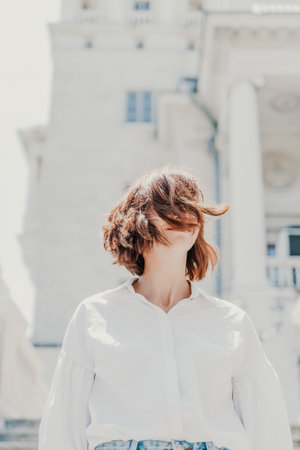Understanding British Hair Types
When it comes to choosing the ideal hair dye shade, understanding the unique characteristics of British hair is crucial. Across the UK, hair types and textures are wonderfully diverse, shaped by both regional variations and rich heritage backgrounds. From the cool blondes of Scotland to the deep brunettes found in England and the vibrant reds that pop up in Ireland and Wales, British hair isn’t a one-size-fits-all affair.
Diversity of Textures and Tones
British hair tends to range from fine and straight to thick and wavy, with everything in between. Genetics, climate, and even water hardness play their part in shaping these characteristics. Here’s a quick overview:
Region |
Common Texture |
Typical Tones |
Heritage Influence |
|---|---|---|---|
| Scotland & Northern England | Fine to medium, often straight | Ash blonde, light brown | Norse & Celtic ancestry |
| Southern England | Medium, sometimes wavy | Warm brown, dark blonde | Saxon & Norman roots |
| Ireland & Wales | Thick, occasionally curly or wavy | Copper red, chestnut brown | Celtic lineage |
| Urban Areas (e.g., London) | Diverse (all types) | Mixed tones: black, brunette, blonde | Global heritage mix |
Why This Matters for Colour Selection
Your natural hair texture and underlying tone can influence how a dye takes to your strands. For example, finer hair may absorb colour faster but fade more quickly, while thicker or curlier textures might need extra processing time. Similarly, underlying pigments—whether ashy, golden, or reddish—will affect the final result once you apply a new shade.
A Tailored Approach for Every Brit
No matter where you’re from or what your background is, taking stock of your individual hair type ensures you’ll end up with a shade that not only suits your style but also lasts longer and looks healthier. So before reaching for that box dye or booking into the salon, get familiar with what makes your locks uniquely British.
2. Identifying Your Skin Undertone
Before you even pick up that box of hair dye from Boots or make a salon appointment, it’s essential to figure out your skin’s undertone. This isn’t just about whether you’re pale as a British winter morning or tanned from a rare sunny holiday in Cornwall; it’s about the subtle hues beneath your skin that can make or break your new look. Knowing if you’re warm, cool, or neutral helps ensure your chosen shade actually flatters you, rather than leaving you looking washed out or overly dramatic.
How to Determine Your Undertone
Here are some quick at-home tests that work a treat:
- Vein Test: Look at the veins on your wrist under natural light.
- If they appear blue or purple, you likely have cool undertones.
- If they look greenish, you probably have warm undertones.
- If it’s hard to tell, you might be neutral.
- Jewellery Test: Does gold or silver jewellery suit you best?
- Gold usually flatters warm undertones.
- Silver complements cool undertones.
- T-Shirt Test: Hold a white and an off-white (cream) top near your face.
- If pure white brightens your complexion, youre likely cool-toned.
- If cream is more flattering, youre probably warm-toned.
Quick Reference Table: British Undertones & Dye Compatibility
| Undertone | Main Indicators | Best Hair Dye Shades |
|---|---|---|
| Cool | Pale skin with pink/red hues Blue/purple veins Suits silver jewellery |
Ash blonde Cool brown Jet black |
| Warm | Peachy/golden skin Green veins Suits gold jewellery |
Golden blonde Honey brown Rich copper/red |
| Neutral | Mix of pink and golden tones Hard to distinguish vein colour Both gold and silver suit you |
Mushroom brown Rose gold Soft caramel |
Why It Matters for British Hair Types
The UK is a melting pot, but many of us fall into classic Celtic fair skin, olive Mediterranean tones, or deeper Afro-Caribbean shades. Picking a dye that works with your undertone ensures the result is natural-looking and enhances your features—no awkward surprises! Whether youre after a subtle update or something bold for festival season, matching your hair dye to your undertone is the first step towards a look youll love all year round.

3. Popular Shade Trends Across the UK
When it comes to picking the perfect hair dye, understanding what’s trending in your city or region can give you some real inspiration. From the urban buzz of London to the artistic vibe of Edinburgh, men across Britain are making bold and stylish choices with their hair colour. Here’s a look at what shades are taking centre stage in some of the UK’s key cities:
| City | Trending Shades | Popular Among |
|---|---|---|
| London | Ash Brown, Platinum Blonde, Jet Black | Young professionals, creatives |
| Manchester | Copper Red, Warm Chestnut, Sandy Blonde | Students, musicians |
| Edinburgh | Smoky Grey, Deep Auburn, Natural Brunette | Artists, academics |
| Birmingham & Beyond | Mushroom Brown, Caramel Highlights, Cool Dark Brown | Businessmen, trendsetters |
If you’re after a classic look that never goes out of style, deep brunettes and jet black shades are still reigning supreme in many British cities. For lads wanting something more daring, platinum blonde and copper red have been spotted everywhere from Soho bars to Manchester’s Northern Quarter. Meanwhile, subtle hues like mushroom brown and caramel highlights offer a sophisticated twist that’s easy to maintain – perfect for those after a low-fuss routine but still keen on turning heads.
The trend among British men is all about individuality: blending natural undertones with modern pops of colour. Whether you want to keep things understated or go bold and bright, there’s a trending shade out there to match your vibe and help you stand out from the crowd.
4. Factoring in the Weather and Lifestyle
The British weather is famously unpredictable, and this can play havoc with your freshly dyed hair. One minute it’s drizzling, the next there’s a rare burst of sunshine – both can impact how long your chosen hair colour lasts and how vibrant it stays. If you’re aiming for a shade that looks sharp all season, it’s important to take the UK climate into account before heading to the salon.
How UK Weather Impacts Hair Dye
| Weather Condition | Potential Impact on Hair Colour | Recommended Care Tips |
|---|---|---|
| Rain & Humidity | Faster fading, frizz, possible dye run-off | Use anti-humidity sprays; opt for water-resistant formulas |
| Sunshine (however rare!) | Colour bleaching and dullness over time | Apply UV-protection sprays; wear hats when outdoors |
| Wind & Cold | Dryness, split ends, brittle strands | Deep-conditioning masks; regular trims to maintain vibrancy |
Lifestyle Choices That Matter
Your day-to-day routine also makes a difference. If you’re always at the gym or love a swim at your local leisure centre, chlorine and sweat can strip your colour. Busy London commutes or coastal walks in Brighton? Pollution and salt air require extra protection.
Top Tips for Maintaining Colour in Any Weather:
- Wash hair less frequently—twice a week is ideal to prevent excessive fading.
- Switch to sulphate-free shampoos designed for coloured hair.
- If you cycle or walk often, tie up your hair or tuck it under a cap to avoid wind damage.
- Always finish with a cold rinse to seal the hair cuticle after washing.
Quick Recap:
- The British climate can be tough on dyed hair—choose shades and products accordingly.
- A bit of forward planning and the right aftercare will keep your colour looking on point, rain or shine.
5. Selecting the Right Formula for Men
When it comes to choosing a hair dye formula, British blokes have a fair bit to consider beyond just the shade. From quick touch-ups before a night at the pub to full-on colour transformations, the right product can make all the difference—especially when you factor in ease of use and your unique hair type. Here’s a breakdown of popular hair dye types and how they suit different men’s needs:
| Formula Type | Best For | Longevity | Ease of Use | Hair Types |
|---|---|---|---|---|
| Semi-Permanent | First-timers, subtle changes, low commitment | 6-8 washes | Very easy (often no mixing) | Fine, normal, or damaged hair |
| Demi-Permanent | Covers early greys, richer tones without harsh regrowth lines | 20-28 washes | Easy (usually pre-mixed) | Normal to thick hair |
| Permanent | Dramatic changes, stubborn grey coverage | Till new growth appears | Moderate (requires mixing & timing) | All types, but especially coarse or resistant hair |
Semi-Permanent Dyes: Low Commitment, Natural Look
If you’re new to colouring or just want to try something out without going all-in, semi-permanent dyes are ideal. They don’t contain ammonia, so they’re gentle on the scalp and fade gradually—perfect for subtle enhancement or covering those first few greys after a long winter.
Demi-Permanent: A Step Up for Blokes with Early Greys
Demi-permanent options offer a happy medium; they last longer than semi-permanent dyes but still won’t give you harsh root lines. They’re a solid choice for British gents wanting to blend away early greys while keeping their look natural.
Permanents: For Long-Lasting Colour and Stubborn Greys
If your aim is bold change or tackling persistent grey hairs, permanent dyes are the way to go. While they require a bit more effort—think mixing and proper timing—they deliver lasting results that hold up through rain, shine, and the odd footie match down the local pitch.
Extra Tips for British Hair Types
- If your hair’s on the fine side (common in many British men), opt for gentler formulas to avoid damage.
- Coarser or curlier hair types benefit from creams or gels that add moisture as they colour.
The Bottom Line:
Selecting the right formula is just as important as picking your perfect shade. Think about your desired commitment level and your natural hair texture before making a choice. With so many bloke-friendly options on the shelves across Britain—from Boots to your local barbers—you’ll find something spot on for your needs.
6. Colour Care: Post-Dye Maintenance
After choosing the perfect hair dye shade for your British hair type, its crucial to maintain that fresh, vibrant look. The unpredictable British weather – from rain to hard water – can take a toll on coloured hair. Here are top British-approved care routines and recommended products to help you keep your new hue looking its best.
British Hair Colour Maintenance Tips
- Limit Washing: Try washing your hair 2-3 times a week. Overwashing can strip colour and natural oils.
- Use Cool Water: Rinse with lukewarm or cool water to lock in colour and prevent fading.
- Protect from Hard Water: Install a shower filter or use chelating shampoos to combat mineral build-up common in many UK regions.
- UV Protection: Even on cloudy days, UV rays can dull your hair colour. Opt for leave-in sprays with UV filters when out and about.
Top Recommended Products in the UK
| Product | Type | Best For |
|---|---|---|
| LOréal Elvive Colour Protect Shampoo | Shampoo | All hair types, daily protection |
| Aussie 3 Minute Miracle Colour Deep Treatment | Treatment Mask | Dull, dry, or damaged hair |
| Pantene Pro-V Colour Protect Conditioner | Conditioner | Softer, shinier hair post-dye |
| Bumble & Bumble Colour Minded UV Protective Polish | Leave-In/Styling | Shielding colour from sun and pollution |
Your Weekly Routine at a Glance
| Day | Routine Step |
|---|---|
| Monday | Gentle wash + conditioner + air dry |
| Wednesday | Mask treatment + cool rinse + scalp massage |
| Friday/Saturday | Quick wash + leave-in protection before heading out |
A Final Word for British Blokes & Ladies Alike:
No matter your chosen shade—ash blonde, copper, chocolate brown, or bold brights—consistency is key. Invest in quality products tailored for coloured hair and adapt your routine to suit the classic British climate. With these simple steps, your chosen shade will stay glossy, healthy-looking, and uniquely you.


